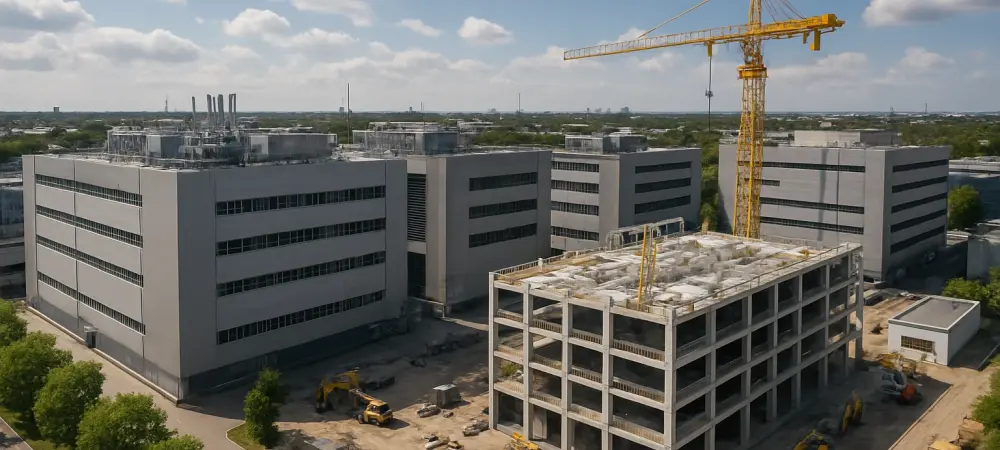What does it take to anchor a cornerstone of Europe’s digital infrastructure in one of the continent’s most dynamic tech hubs? In Munich, a city pulsating with innovation, NorthC, a prominent European data center provider, has made a monumental decision that reverberates across the industry. By securing a 25-year lease extension for its facility on the Neue Balan campus, NorthC isn’t just renewing a contract—it’s staking a claim in the future of data-driven growth. This bold move, set against the backdrop of skyrocketing demand for cloud computing and connectivity, invites a closer look at why Munich remains a magnet for tech giants and what this commitment signals for the broader digital landscape.
A Strategic Leap in a Thriving Sector
The data center industry is experiencing an unprecedented boom, fueled by the relentless digitization of everything from business operations to personal entertainment. NorthC’s decision to lock in a quarter-century lease in Munich reflects a calculated confidence in the region’s enduring relevance. This isn’t merely a real estate deal; it’s a declaration of intent to be at the heart of Europe’s technological evolution, where stability and foresight are as critical as power capacity and cooling systems.
Such long-term commitments are rare in an industry often characterized by rapid shifts and short-term gains. Yet, NorthC’s choice to double down on the Neue Balan campus, located in Munich’s bustling Haidhausen district, underscores a belief that some locations are irreplaceable. With digital infrastructure becoming the backbone of modern economies, this move positions the company to meet the escalating needs of enterprises navigating an increasingly data-intensive world.
Munich’s Unrivaled Edge in the Tech Ecosystem
Why does Munich stand out amid a crowded field of European tech hubs? The city’s allure lies in its unique blend of infrastructure, accessibility, and talent. Positioned as a gateway to southern Europe, Munich offers proximity to major transport nodes like Ostbahnhof and key highways, ensuring seamless connectivity for businesses operating at the Neue Balan campus. This logistical advantage is a magnet for companies seeking efficient operations in a competitive market.
Beyond physical infrastructure, Munich boasts a thriving cluster of IT and software firms that feed into a vibrant innovation ecosystem. The concentration of skilled professionals and cutting-edge enterprises creates fertile ground for collaboration, making the city a strategic focal point for data center operators. NorthC’s extended presence here taps directly into this dynamic, aligning with global trends of urbanization that prioritize tech-centric locations for digital expansion.
NorthC’s Calculated Growth in Germany
Since entering the German market a few years ago through the acquisition of IP Exchange, NorthC has pursued an aggressive growth strategy in Munich. The company’s facility on Neue Balan, spanning 4,800 square meters with a 2MW power capacity, has become a linchpin of its regional operations. Securing a 25-year lease extension with Allgemeine Südboden AG guarantees operational continuity, a crucial factor in an industry where uptime and reliability are non-negotiable.
This extension isn’t an isolated move but part of a broader expansion blueprint. The recent acquisition of additional assets from Colt Technology Services in Munich further solidifies NorthC’s foothold in the area. These strategic maneuvers mirror a wider wave of consolidation in the European data center sector, where operators are scaling up to address the surge in demand driven by remote work, AI advancements, and cloud adoption—a trend showing no signs of slowing down.
Industry Perspectives on Neue Balan’s Draw
The value of Neue Balan extends beyond mere square footage or power specs; it’s about the environment it fosters. Bettina Krause, head of leasing at Allgemeine Südboden AG, highlighted the campus as a pivotal part of Munich’s commercial fabric, ideally suited for tech-driven enterprises. Her remarks point to a deeper understanding of how location can catalyze business success in the digital age, offering a space where innovation isn’t just possible but inevitable.
Echoing this sentiment, Donald Badoux, NorthC’s managing director for the DACH region, praised the campus for its role in nurturing digital progress. He noted the diverse mix of large and medium-sized companies, especially in IT and software, as a driving force behind a collaborative atmosphere. These insights reveal a fundamental truth: in the data center realm, a prime spot like Neue Balan isn’t just infrastructure—it’s a hub for synergy and forward-thinking development.
Lessons for Businesses in a Digital Era
NorthC’s long-term commitment in Munich offers valuable lessons for companies navigating the complexities of digital transformation. Prioritizing strategic locations with robust connectivity and access to tech talent is essential for scalability, as demonstrated by the choice of Munich over other potential sites. Businesses should consider hubs that offer both physical and intellectual infrastructure to support sustained growth.
Equally important is the emphasis on long-term planning. A 25-year lease provides a buffer against market volatility, allowing firms to focus on innovation rather than relocation risks. Additionally, embedding operations within vibrant tech ecosystems can spark partnerships and breakthroughs, a strategy NorthC has leveraged by aligning with Munich’s IT clusters. These principles highlight how anchoring in a key hub with a forward-looking mindset can redefine competitive advantage in today’s fast-evolving landscape.
Reflecting on a Milestone for Digital Infrastructure
Looking back, NorthC’s 25-year lease extension in Munich marked a defining moment in the trajectory of Europe’s data center industry. It underscored the pivotal role of location and stability in meeting the relentless demand for digital services. The decision to deepen roots in the Neue Balan campus reflected a broader vision of sustained growth amid a rapidly changing technological frontier.
For businesses and tech leaders, the takeaway was clear: invest in strategic hubs with an eye toward long-term impact. Exploring partnerships within innovation-rich environments like Munich could unlock new opportunities. As the digital economy continues to expand, prioritizing foresight and location will remain critical steps in building resilient, future-ready operations.

